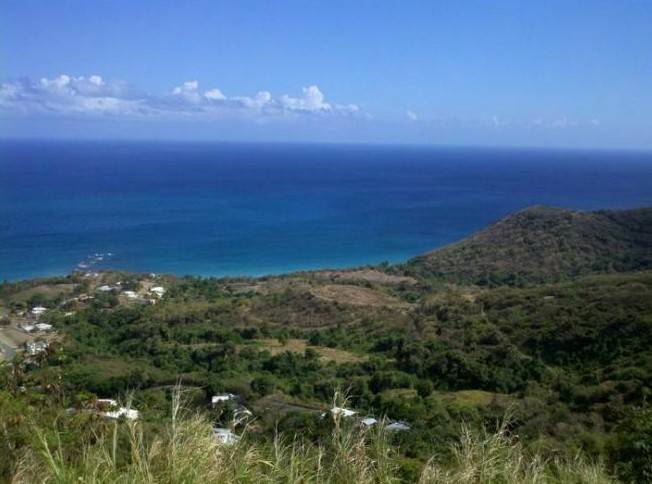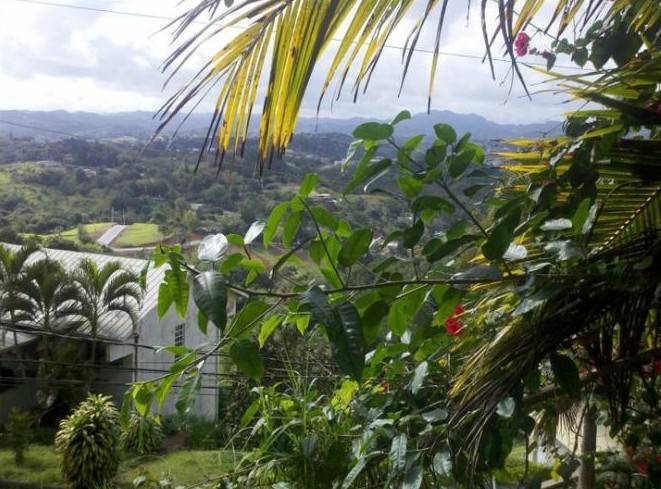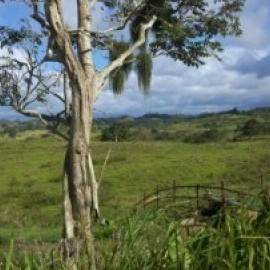
The barber tinkered with my head at his leisure. But he and his partner rattled on in a clipped Caribbean dialect at breakneck pace, discussing the sexuality of their rival down the street. A full stalk of green bananas sat propped up in the empty chair in the corner.
A very pregnant young woman in a skin-tight, belly-revealing outfit chimed in before suggesting she go out to the plaza to buy us all bacalaoitos, breaded fried fish fritters.
Did I want one?, they asked me. I certainly did.
The first thing I do when traveling anywhere is to get a haircut, my effort to integrate into the local landscape. To be offered this local finger food was a good sign of some success here in Ciales, a small inland town I chose for its isolation from the overwhelming Puerto Rican tourist industry and also for its name, which signifies (in altered spelling) potency in a pharmaceutical age. If nothing else, getting a Ciales haircut would add to a good story.
Puerto Rico today is a shell of the place it was when I lived on the island as a boy, when I climbed the mountain behind my house to pick fallen guavas from the ground or hunt lizards. Spring break was my first visit back and I came prepared for the worst and, more or less, found it.

I complied a list of Things I Don’t Like About Puerto Rico. It’s too expensive, as expected. The traffic is ridiculous, the road signs lie, and maps contradict each other and reality. Puerto Rican Spanish is crude and sloppy and, worse, people refuse to speak it with me, preferring slangy English.
My purpose of returning after all this time was to visit the plantation manor where I had lived, the Ulrich Foundation house in the panoramic inland Aibonito. The house had fallen into disrepair, unattended for 17 years, and only recently had a couple acquired the property with the intention of renovating it for a local retreat and coffee shop.
It would be a massive undertaking. Termites and local teens had taken their toll. Walking through what had once been my home, I was haunted by the space, which had remained the same, a space where tarantulas sometimes were found under the bed and where I spent my nights listening to the tiny coqui frogs croak their blaring, incessant song.
Flowering trees and the crowing roosters still populate the island. The majestic vistas from the highest point on the island, where both seas, the Atlantic and the Caribbean, are visible in opposite directions. The roads still zig-zag up and down the mountains with such intensity that one’s arms ache from the exercise of steering at the same time one’s ears continuously pop.
The road down the lane from the manor was the place where we boys used to chase sugar cane trucks to steal sweet stalks, but memory plays tricks. I remembered it running the other direction. Nowadays, the traffic roars past loudly with no dawdling sugar cane trucks in sight.
The monasteries on the distant mountain were still there, but these days open to customers, for visitors to come for weekend spiritual retreats.
The old town of Aibonito was gone, slathered over by capitalist prosperity, but the skeleton remains and the ghosts abide. Where we used to gather avocados for free, today the town supermarket sells them, two for $5.
A 10K run was being held on the Sunday I arrived. Participants of all ages panted their way into the town plaza, cheered on by a crowd, with hip-hop blaring from the stage. I walked the streets by intuition. Here was the corner where I bought my penny candy from a newsstand. Here was the place where the father of my classmate Jaime had a a magic and novelty shop, now shuttered, broken, and vacant. Another street corner jarred me with recognition: this space had appeared in my dreams, unrecognized, over the past 50 years.
I walked down the half-familiar streets, down side paths where overhanging bamboo groves creaked together like an building about to collapse. The next day, I visited the country school I had attended. Little had changed. Looking through the school records and the library there, I found black and white pictures of my classmates, classrooms, the tether ball court, the wooden paneled jeeps that hauled us to and from school.
In San Juan, Bebo’s restaurant hosts hundreds of Puerto Ricans and tourists with authentic cuisine. The distinctive smell of those rice and beans, the same that had been force-fed me at school every day, was the most powerful reminder of what the culture used to be. But the city itself has been given over to commerce and tourism. The strip of exquisite houses on Condado Beach have been renovated for Chili’s restaurants and other chains, with only one or two houses remaining, and those have “for sale”signs, the owners holding out for the best offer to be transformed into the latest trendy restaurant or condo complex.
Peruvian cuisine is the current trend in many restaurants; Broadway transplants such as “Equus” and “Boing Boing” are trumpeted in ads.
Driving along one of the crowded coastline highways one day, I saw someone wearing a red Claro T-shirt with the lettering “Claro que te quiero.” Verizon was recently bought out by Mexico’s Carlos Slim, the wealthiest man on earth (worth $74 billion), and renamed the Claro network. “Claro” means “clear,” but the word also is used to signify “of course” colloquially, so the T-shirt cleverly means, “Of course I love you.” I had to have one and stopped in every Claro shop along the route – and there were many – until I bribed a worker to giving me one.
As for the language itself, Puerto Rican (and Cuban or Caribbean) Spanish is some of the sloppiest, crudest Spanish in the world, rapid-fire, with dropped letters, slurred, and the “s” sound sometimes blatantly eliminated altogether.
The Camuy Caverns on the west side of the island is the largest cave systems in the western hemisphere, with spectacular views and an underground river, but the number of tourists that go there diminishes its allure. Two Indian girls talked nonstop about their plans to live in London and their engagement plans, ending every sentence on the uptone and peppering everything with dollops of the word “like.” They were hardly present to observe the caves and their history at all. I much would have preferred sloppy Spanish that I could barely comprehend to this all-too-common and comprehensible English.
With the entire island largely given over to commerce and tourism, one detects a certain half-heartedness for natives in their enthusiasm for the island. “Do you LIKE to go to the beach?” one Ponce resident asked me when I pondered plans. A professor of communication in San Juan, Eliseo, distinctly winced at even the thought of leaving the city for the mountainous heart of the country. “I always hated to go inland, even as a child,” he told me.
On the other hand, two transplanted New Yorkers, Bartus and Elizama, hosted me one night in their mountainside home north of Ponce. They work in holistic health care and shiatsu massage and have transformed the home and studio they bought on the side of a mountain (for a remarkable $140,000) into a personal retreat, named “GREEN IS ZEN.” High on the mountain, one can see the ocean in the near distance from their back porch. They have four dogs. They’re planting organic fruit trees and working the land.
“It really is paradise,” Bartus said, while watching the House episode he’d put on the DVR the night before. Here was a couple, at least, who seem to have found the means to recover something of what Puerto Rico used to be and perhaps could be again.
The next day, with no distinct plan other than to head toward the rain forest, El Yunque, for a full day of exploration, I found myself unable to find a room to spend the night. Another thing I don’t like about Puerto Rico: there are no hotels. There are expensive resorts, but inland, next to nothing. For all the Burger Kings and Taco Bells, there are absolutely no Day’s Inns. The island is small enough that locals are much more likely to drive back home for the night rather than stay in a hotel.
So, I found myself outside Caguas, desperate for a place to sleep. Finally, after inquiring again and again, a kindly man attending a Lenten church service suggested I stay at a themed sex motel, the Hotel OK, for $25, free porn channels on flat-screen included.
“They may look at you funny because you are alone,” he said, “but that doesn’t matter.”
The room and bed were comfortable enough, but there was no reading lamp on the end table. I thought about complaining.
 Early the next morning, I hiked the rain forest alone. The El Yunque National Forest is still ancient, fertile, moist, and wild. I took the Big Tree Trail to La Mina Falls. I climbed the Baño de Oro up to the Lookout Tower on Mt. Britton Spur and perched myself in the clouds. The ocean sporadically appeared when the winds parted the cloud cover. And until the tourists arrived in buses, there was a moment when Puerto Rico had regained the wildness that money cannot buy. I had escaped the wilderness of commerce for a brief moment.
Early the next morning, I hiked the rain forest alone. The El Yunque National Forest is still ancient, fertile, moist, and wild. I took the Big Tree Trail to La Mina Falls. I climbed the Baño de Oro up to the Lookout Tower on Mt. Britton Spur and perched myself in the clouds. The ocean sporadically appeared when the winds parted the cloud cover. And until the tourists arrived in buses, there was a moment when Puerto Rico had regained the wildness that money cannot buy. I had escaped the wilderness of commerce for a brief moment.
Before my plane returned, I weighed my options. I could have spent the morning under a beach umbrella, or explored the shops of Old San Juan. Instead, I hiked to the botanical gardens at the University of Puerto Rico. Although in the heart of the city, it is an isolated treasure, rich with trees and vegetation and wildlife, with meandering pathways and park benches hardly ever discovered. There was no one around. The living green earth was here, peaceful, caged as though in a museum, preserved for our memories.








